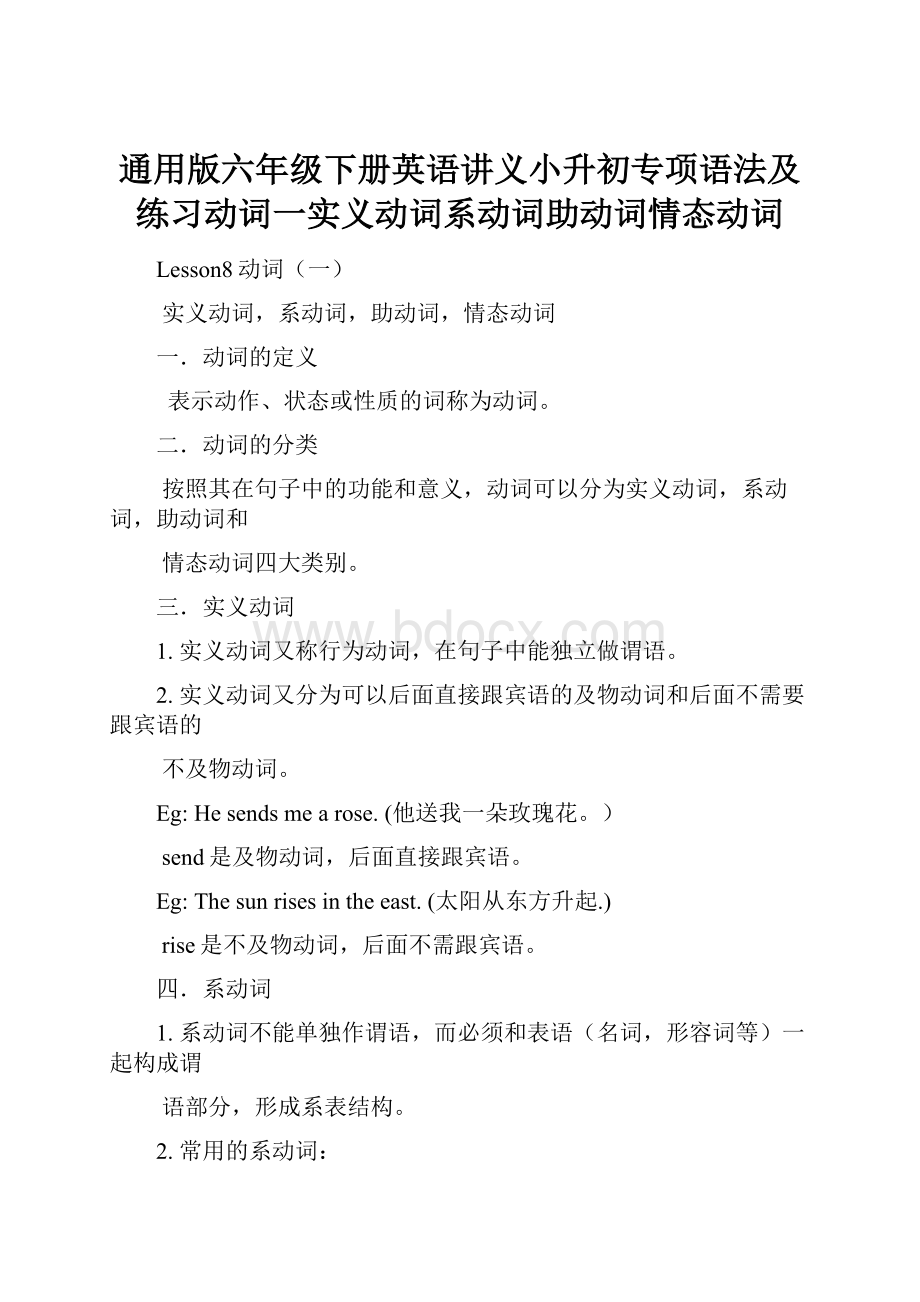通用版六年级下册英语讲义小升初专项语法及练习动词一实义动词系动词助动词情态动词.docx
《通用版六年级下册英语讲义小升初专项语法及练习动词一实义动词系动词助动词情态动词.docx》由会员分享,可在线阅读,更多相关《通用版六年级下册英语讲义小升初专项语法及练习动词一实义动词系动词助动词情态动词.docx(12页珍藏版)》请在冰豆网上搜索。

通用版六年级下册英语讲义小升初专项语法及练习动词一实义动词系动词助动词情态动词
Lesson8动词
(一)
实义动词,系动词,助动词,情态动词
一.动词的定义
表示动作、状态或性质的词称为动词。
二.动词的分类
按照其在句子中的功能和意义,动词可以分为实义动词,系动词,助动词和
情态动词四大类别。
三.实义动词
1.实义动词又称行为动词,在句子中能独立做谓语。
2.实义动词又分为可以后面直接跟宾语的及物动词和后面不需要跟宾语的
不及物动词。
Eg:
Hesendsmearose.(他送我一朵玫瑰花。
)
send是及物动词,后面直接跟宾语。
Eg:
Thesunrisesintheeast.(太阳从东方升起.)
rise是不及物动词,后面不需跟宾语。
四.系动词
1.系动词不能单独作谓语,而必须和表语(名词,形容词等)一起构成谓
语部分,形成系表结构。
2.常用的系动词:
(1)be动词(am/is/are/was/were)
(2)5个感官系动词:
look看起来smell闻起来taste闻起来
sound听起来feel摸起来(后+形容词)
Eg:
Shelooksbeautifultoday.她今天看起来很漂亮。
Theflowerssmellsweet.这些花闻起来很香。
Thatsoundsgood.那听起来不错。
(3)get/become/turn/go表变化,后加形容词。
Eg:
Itgetswarmerandwarmer.天气变得越来越暖和。
Infall,theleavesturnyellow.秋天树叶变黄。
Thefoodgoesbadeasilyinsummer.食物在夏天很容易变坏。
五.助动词
1.助动词本身没有词义,不能单独做谓语,只能和主要动词一起构成谓语动词,
表示否定、疑问、时态、语态等语法形式,或用来加强语气。
常用的助动词
有:
be,do,have,shall,will。
2.助动词be
(1)可用于构成时态,主要是进行时:
Iamlookingatyou.
(2)可用于构成被动语态:
Youarebeinglooked.
(3)可与动词不定式构成谓语:
Myjobistolookatyoueveryminute.
3.助动词have
(1)构成完成时态:
WehavelearnedEnglishformanyyears.
(2) 和动词不定式构成谓语,表示因客观环境促使不得不做的事情:
WehavetolearnEnglishverywell.
4.助动词do
(1)构成疑问句和否定句:
Dosehedohishomeworkafterschool?
(2) 用来加强语气:
Idowanttobuyanewcar.
(3) 用来代替动词词组:
Writealetter“L”asIdo.
5. 助动词shall
构成将来时态,单纯表示未来情况:
ShallIbegin?
6. 助动词will
构成将来时,用于第一,二,三人称。
TheywillgotoEnglandforaholiday.
六.情态动词
1.情态动词表示说话人对某一动作或状态的态度,或表示主观设想。
2.情态动词有自己的词义,但不能单独做谓语,必须和不带to的动词不定式
(即动词原形)连用,没有人称和数的变化。
现在形式
过去形式
否定式
疑问式
用法
may
might
maynot
Maysub.
1表示允许或征询对方的许可,有“可以”的意思:
MayIcomein?
Youmaybegin.
2回答may引导的疑问句时,有mustn’t表示否定:
MayIsmokehere?
No,Youmustn’t.
3Might不一定代表过去,而是表示更加委婉的口气:
MightIaskyoutodance?
can
could
cannot
Cansub.
1表示能力,有“能”“会”的意思:
Icanswim.
2表示允许,在口语中代替may:
CanIaskyouaquestion?
3“can”和 “beableto”的比较:
主要是时态。
Can只能用于现在时和过去时,其它时态要用beableto。
must
hadto
mustnot
Mustsub.
1表示必须,应该:
Studentsmustdothehomework.
2否定形式表示禁止:
Youmustn’teatatclass.
3在回答must疑问句时,否定式常用needn’t,或don’thaveto,表示“不必”、“用不着”。
4must与haveto的比较:
must表示说话人的主观看法,haveto表示客观需要,must只有现在时,要表示过去时或将来时需要用hadto和willhaveto.
will
would
willnot
Willsub.
1用于疑问句,表示请求,邀请:
Willyoucomewithus?
2表示意愿:
I’lltellyouastory.
3表示预料或习惯性的动作:
Hewillcometonight.
shall
should
shallnot
Shallsub.
用于第一人称,征求对方的意见或指示:
ShallIopenthedoor?
need
neednot
Needsub.
1.作为情态动词主要用于否定句和疑问句:
NeedIanswerthisquestion?
Youneedn’tanswerit.
2.作为及物动词,注意否定及疑问形式需要助动词do
needtodo;don’tneedtodo;DoIneedtodo
3.常用的情态动词有:
can,may,must,will,shall,should,would,need.
4.can,may,must表示推测,猜测。
现在
过去
肯定
must/maybe(状态,后接形容词,名词等)
一定.../可能.....
must/maybedoing(动作)
一定正在..../可能正在....
musthaveVp.p
那是一定....
mayhaveVp.p
那是可能....
否定
can’tbe
不可能....
can’tbedoing
不可能正在....
can’thaveVp.p.
那是不可能....
部分情态动词后接完成时:
shouldhavedone本应该做…(实际上没做)Youshouldhavefinishedyourhomeworkbeforesleeping.
shouldn’thavedone本不应该做…(实际上做了)Hismotherwasveryangry.Heshouldn’thavesaidthat.
needn’thavedone本没必要做…(已经做完了)Youneedn’thavepaidforitbecauseitwasforfree.
小升初专项练习—实义动词,系动词,助动词,情态动词
一.写出下列句子中划线动词的种类。
1.IamstudyinginNo.1MiddleSchool.
2.ThislittlechildcanspeakEnglishwell.
3.Willyoupleasegotothecinemawithme?
4.Hedidhishomeworkbyhimselfyesterday.
5.IhavebeenlearningEnglishformanyyears.
6.Springishere.Thetreesturngreen
7.MayIgotothecinemawithyou,Dad?
8.Iusuallygetupatsixonweekdays.
9.--Whobrokethewindow,boys?
--Idid,MissGao.
10.Heplaysfootballafterschool.___________
11.Iwaslateyesterday.___________
12.Shemustbehungry.__________
13.Helooksveryyoung._________
14.Theywentswimmingyesterdayevening.__________
15.Idon’thaveanysisters.___________
二.单项选择。
1.--Let’sgotoTaishanParkbytaxi.–It’snotfar.We______takeataxi.
A.needn’tB.can’tC.mustn’tD.couldn’t
2.–IthinkMissGaomustbeinthelibrary.Shesaidshewouldgothere.
--No,she______bethere.Ihavejustbeenthere.
A.can’tB.mustn’tC.needn’tD.wouldn’t
3.You______playwithfire,Tom.It’sverydangerous.
A.needn’tB.maynotC.mustn’tD.wouldn’t
4.Asweknow,fish______dieoutofwater.
A.mayB.isgoingtoC.canD.will
5.–Canyouanswermyquestion,Lily?
–Yes,I______.
A.mayB.needC.mustD.can
6.–Excuseme,______youtellmethewaytothenearestbusstation?
--Sorry,Ican’t.I’mastrangerhere.
A.canB.needC.mustD.may
7.--______Ihavetoshowtheschoolrlreporttomyparents,MissKing?
--Yes,youdo.
A.MustB.DoC.CanD.May
8.Whenautumncomes,sometreeleaves______red.
A.soundB.turnC.smellD.taste
9.--______weswiminthatriver?
–No,you______.It’sdangeroustoswimthere.
A.Must,can’tB.Can,maynotC.Shall,don’tD.May,mustn’t
10.Aftersuchalongjourney,thechildren______beverytirednow.
A.canB.mustC.havetoD.need
11.You’vemadethesamemistakesagain.You______bemorecarefulnexttime.
A.canB.mayC.hadtoD.should
12.--______Ifillinthecheck-informrightnow,sir?
--No,youneedn’t.Youcancompleteitthisafternoon.
A.MayB.CanC.WouldD.Must
13.–MustIfinishreadingthebooktoday?
--No.You______ifyouhavesomethingelsetodo.
A.mustn’tB.couldn’tC.can’tD.don’thaveto
14.Youlooktirednow.You______stayathomeandhavearest.
A.hadtoB.hadbetterC.wouldliketoD.wouldrather
15.–CouldIlookatyourpictures?
–Yes,ofcourseyou______.
A.couldB.canC.willD.might
16.Lookatthosebigblackclouds.It______rain.Let’shurry.
A.mustB.willC.wouldD.isgoingto
17.–Mum,mayIwatchTVnow
--Sure,butyou______helpmewithmyhouseworkfirst.
A.canB.mayC.mustD.could
18.–Wouldyouliketogoswimmingwithmethisafternoon?
--I’dloveto.ButI’mafraidI______.Ihavetoomuchworktodo.
A.can’tB.mustn’tC.needn’tD.maynot
19.--______youliketogoshoppingwithme?
–Yes,I_____
A.Would,wouldB.Will,willlikeC.Would,wouldloveD.Would,wouldloveto
20.–Iwastoldtobeherebeforeseven.--Oh,you______.
I’msorryfornottellingyouthatwehavechangedtheplan.
A.mustB.can’tC.mayD.needn’t
三.选用选用选用选用may,must,can,can’t,should填空:
1.“______yourbrotherspeakEnglishverywell,too?
”No,he______.”
2.“______youplaytennis?
”“Yes,I______.”
3.Theboxisveryheavy.Tom______moveit.
4.“Whataboutseeinganewfilmthisevening?
”
“I’mafraidI______.I______finishmyEnglishexercisesthisevening.”
5.Thisfishwon’tkeepfresh,we______eatitnow.
6.You______doit,so______I.
7.You______startnow,oryou’llbelate.
8.Excuseme,sir.______Iaskyouaquestion,please?
9.I’mnotsureaboutthenews.It______or______notbetrue.
10.Lilyisn’there.
She______havegonetotheschoollibrary,orshe______havegone.
四.用mustn’t,needn’t填空:
1.You______writetomeifyoudon’thavethetime.
2.You______hurry.I’msureyouwon’tbelate.
3.You______forgettowritetomewhenyouarrivethere.
4.Jane,you______playwiththeknife.It’sverydangerous.
5.–MustIgetthereontimetoday?
–No,you______.
6.Timeisflying.We______wasteourtime.
7.You______beafraidofthedifficulty.We’llgiveyouahelpinghand.
8.–“MustIhandinthemathsexercisestomorrow?
”
--No,you______.Youmayhanditinthedayaftertomorrow.
9.Tom,you______readinthesun.It’snotgoodforyoureyes.
10.You______worrysomuch.I’msurehe’llbewellsoon.
五.用适当的情态动词填空:
1.Nobody____livewithoutairandwater.
2.--_____hespeakChinese?
--Yes,alittle.
3.Thebook_____bereturnedbeforeSaturday.
4.--_____Icomein?
--Yes,please.
5.You____giveupsmokingatonce.It'sbadforyourhealth.
6.Excuseme,____Iaskyouaquestion?
7.____youtellmewherethestationis?
8.Thetrainwillleaveathalfpastsix,soI____gettherefifteenminutesearlier.
9.Youdon't____worryabouther.Sheismuchbetternow.
10.Ifyouwanttopasstheexam,you____workhard.
11.A:
______Ifinishmyhomeworknow?
B:
No,you______.You______doittomorrow.
12.A:
Thispencilisveryshort,______youstilluseit?
B:
No,I______.You______buyoneforme.
13.A:
______Igooutandplaybasketball,mum?
B:
No,you______finishyourhomeworkfirst.
14.A:
______Iplayfootballinthestreet?
B:
No,you______.
15.A:
______youfindmanypeopleinthedoctor’swaitingroom.
B:
No,I______.